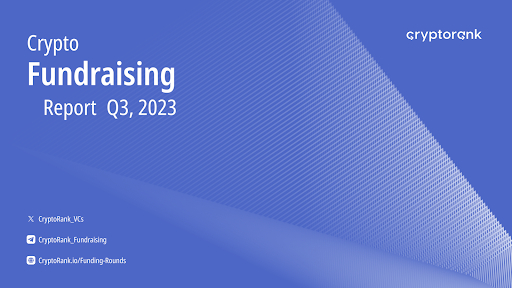CryptoRank’s Q3 Fundraising Report
Disclaimer: The text below is a press release that is not part of Cryptonews.com editorial content.
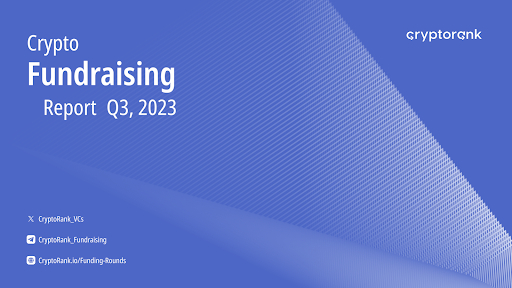

Introduction
The negative trend in crypto fundraising persisted during Q3 2023, with decreasing investment volumes and only a few significant deals. Investor concerns and uncertainty resulted in the stagnation of crypto fundraising for the year. This report from the CryptoRank team examines the key trends, narratives, and statistics of the crypto fundraising sector during Q3.
Key Highlights:
- Crypto startups raised $1.61B in 222 deals in Q3 2023, down 31.5% from Q2 and 75.8% from Q3 2022.
- Blockchain services were the most popular category for investors in Q3 2023 ($515 million in 73 deals in Q3).
- Binance Labs and Coinbase Ventures were the most active Tier 1 investors in Q3. Both funds focused on investing in the DeFi sector.
- Investors preferred to invest in early stage projects in Q3.
Q3 Fundraising Landscape in Numbers
Crypto startups raised $1.61B in 222 deals in Q3 2023, a 31.5% decrease from Q2 and a 75.8% decrease from Q3 2022. These figures clearly indicate the downward trend that crypto fundraising is facing in 2023. Following market stagnation and regulatory uncertainty, the amount raised by crypto companies is also decreasing.
Blockchain services were the most attractive category for investors in Q3 2023. Startups developing various services and blockchain tools received $515M in 73 deals in Q3. CeFi projects surprisingly became the second most popular category, raising $300M (BitGo’s $100M funding round was the largest one), ahead of GameFi ($215M) and DeFi ($178M).
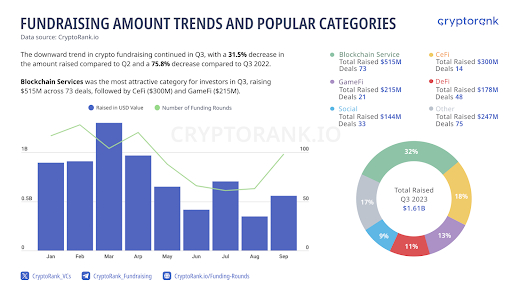
Quarterly Focus: Notable Funding Rounds
Despite the downward trend in crypto fundraising, there are still interesting projects that are receiving funding from leading crypto VC firms. In this article, we will take a closer look at the top 10 startups that received investment from Tier 1 crypto funds in Q3 2023.
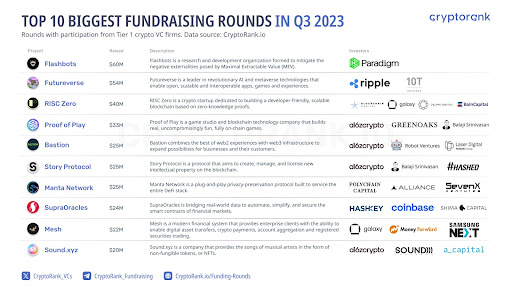
Let’s take a closer look at the top-3 leaders:
- Flashbots, a research and development organization formed to mitigate the negative externalities posed by Maximal Extractable Value (MEV), raised $60M in a Series B round led by Paradigm. Flashbots’ mission is to enable a permissionless, transparent, and sustainable ecosystem for MEV, using the following approach:
- Illuminate: bringing transparency to MEV activity.
- Democratize: democratizing access to MEV revenue.
- Distribute: enabling sustainable distribution of MEV revenue.
- Futureverse, a leader in revolutionary AI and metaverse technologies that enable open, scalable, and interoperable apps, games, and experiences, raised $54M in a Series A round with participation from Ripple. The FuturePass Smart Wallet SDK enables simple, fast, secure, and password-free onboarding of users to web3 applications, games, and experiences.
- RISC Zero, a crypto startup dedicated to building a developer-friendly, scalable blockchain based on zero-knowledge proofs, raised $40M in a Series A round led by Blockchain Capital. The RISC Zero zkVM, released in April 2022, can prove the correct execution of arbitrary code, allowing developers to build ZK applications in mature languages such as Rust and C++.
It is worth noting another project that received the largest investment in Q3 2023. BitGo raised $100M from undisclosed investors in August at a valuation of $1.75B. BitGo is known as the custodian of WBTC. Its focus on being licensed and regulated has helped it stand out in the uncertain legal landscape for digital assets. The funding, received entirely from new investors, will be used for strategic acquisitions, with two deals already in progress. BitGo’s previous investors include Goldman Sachs, DRW Holdings, and Galaxy Digital Ventures.
Investors Movements: Key Highlights
Binance Labs and Coinbase Ventures were the most active Tier 1 investors in Q3. Both funds focused on investing in DeFi projects (5 deals from Binance Labs and 3 from Coinbase Ventures), while other participants preferred Services as their main investment sector.
Balaji Srinivasan, the former CTO of Coinbase, is on the list of the most active investors in Q3. Balaji’s favorite category in Q3 was social projects (3 deals with his participation).
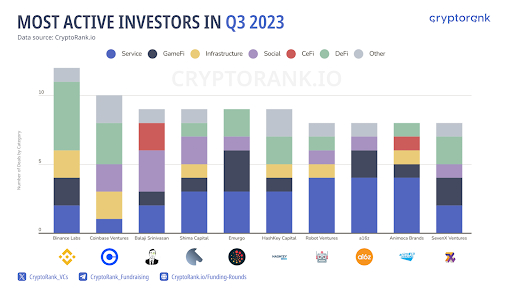
Investors still prefer to support projects in the early stages. In Q3, VC firms participated in 75 seed rounds with $405.6M invested.
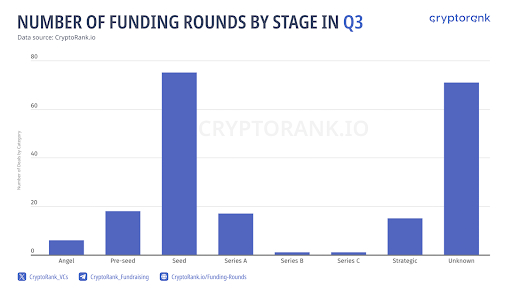
Overall, seed rounds account for 33% of the total number of deals since the beginning of the year.
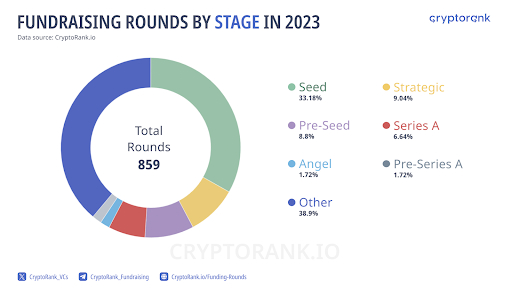
Investing in early-stage projects can be a profitable strategy if the companies receiving investment successfully develop their products and enter the market. However, supporting early-stage crypto startups is also risky since there is no guarantee that these projects will succeed in the rapidly changing crypto environment.
Most Popular Jurisdictions for Fundraising
Despite regulatory pressure, the US remains the most active crypto venture hub. In Q3 2023, US-based crypto startups raised $743.1M, equal to 46% of the total amount raised in Q3. Surprisingly, India became the second most popular jurisdiction for crypto investment: companies based in the country raised $76.1M in Q3. Hong Kong, with its crypto-friendly policies, came in third, attracting $35M in investment. France became the most popular jurisdiction among EU countries, with over $30M invested in crypto projects.
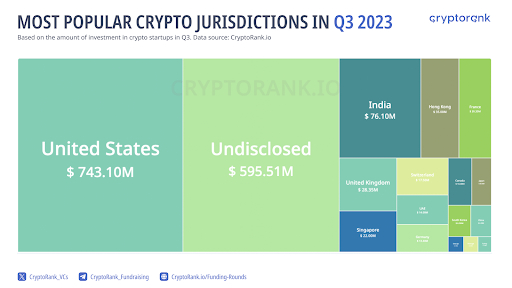
Closing Thoughts
The crypto fundraising sector is far from optimal conditions in 2023, and the negative trend continued in Q3. The amount of investment in crypto projects is steadily decreasing, falling by 75.8% (YoY) in Q3. However, the improvement of market conditions and the start of a much-anticipated “bull run” may quickly change the situation and boost crypto fundraising.
Investment funds are actively supporting various projects developing blockchain-related services and tools that improve, scale and simplify the work of the crypto industry backbone, blockchains. The development of such services is crucial for the further expansion of blockchain technology and the mass adoption of crypto in people’s everyday lives.
Projects are typically funded in the early stages of product development, an investment strategy that can be very lucrative for venture capital firms, but also risky given the rapidly changing crypto landscape.
The US remains the largest venture hub for crypto startups, despite a hostile regulatory environment. However, if regulatory uncertainty is not resolved, the US may lose its position in favor of new emerging crypto hubs such as Hong Kong.


